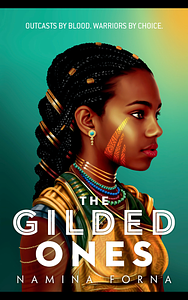Take a photo of a barcode or cover
adventurous
dark
inspiring
medium-paced
Plot or Character Driven:
A mix
Strong character development:
No
Loveable characters:
Yes
Diverse cast of characters:
Yes
Flaws of characters a main focus:
No
I love losing myself in an immersive story with a history and a mythology and a dragon or two. The Gilded Ones is the best fantasy I’ve read all year.
This book is incredible. Deka is an outcast and a survivor. She’s one of the alaki, a cursed group of women who are ordered to the frontlines of battle or brutally killed. The alaki are seen as cursed women who bleed gold and live unnatural long lives. As Deka begins her training, she begins learning that this cursed nature may truly be a gift. She also begins nurturing found-family relationships with her warriors in arms in the midst of utter brutality, and honestly, those side characters are reason enough to love this book.
I’m trying not to spoil anything, but the characters are fantastic, the world building is sublime, and I can’t wait for the next one to come out. If you like The Hunger Games, Children of Blood and Bone, or Six of Crows, check this one out.
Best Words: “The world is changing now. We’re going to make it change—make it better. We’re going to make sure that what happened to us never happens to anyone else.”
This book is incredible. Deka is an outcast and a survivor. She’s one of the alaki, a cursed group of women who are ordered to the frontlines of battle or brutally killed. The alaki are seen as cursed women who bleed gold and live unnatural long lives. As Deka begins her training, she begins learning that this cursed nature may truly be a gift. She also begins nurturing found-family relationships with her warriors in arms in the midst of utter brutality, and honestly, those side characters are reason enough to love this book.
I’m trying not to spoil anything, but the characters are fantastic, the world building is sublime, and I can’t wait for the next one to come out. If you like The Hunger Games, Children of Blood and Bone, or Six of Crows, check this one out.
Best Words: “The world is changing now. We’re going to make it change—make it better. We’re going to make sure that what happened to us never happens to anyone else.”
Maybe the best book I’ve read so far this year? What a ride. This story is a mythical, complex world with some dystopian/fantasy vibes that I am very into. A couple of great plot twists and surprises, some of which I saw coming and some of which I did not. Satisfying conclusion so I am really curious to see where the plot goes next in the series!
adventurous
challenging
dark
emotional
funny
hopeful
inspiring
lighthearted
mysterious
sad
tense
medium-paced
Plot or Character Driven:
Plot
Strong character development:
Yes
Loveable characters:
Yes
Diverse cast of characters:
Yes
Flaws of characters a main focus:
Complicated
Sixteen-year-old Deka lives in fear and anticipation of the blood ceremony that will determine whether she will become a member of her village. Already different from everyone else because of her unnatural intuition, Deka prays for red blood so she can finally feel like she belongs.
But on the day of the ceremony, her blood runs gold, the color of impurity–and Deka knows she will face a consequence worse than death.
Then a mysterious woman comes to her with a choice: stay in the village and submit to her fate, or leave to fight for the emperor in an army of girls just like her. They are called alaki–near-immortals with rare gifts. And they are the only ones who can stop the empire’s greatest threat.
This is a good debut novel, especially if you're a feminist. The writing is simple for a YA fantasy. I gave it 4 stars because I found 2 major discrepancies.
But on the day of the ceremony, her blood runs gold, the color of impurity–and Deka knows she will face a consequence worse than death.
Then a mysterious woman comes to her with a choice: stay in the village and submit to her fate, or leave to fight for the emperor in an army of girls just like her. They are called alaki–near-immortals with rare gifts. And they are the only ones who can stop the empire’s greatest threat.
This is a good debut novel, especially if you're a feminist. The writing is simple for a YA fantasy. I gave it 4 stars because I found 2 major discrepancies.
Overall a good book it was fairly enjoyable. I would have ranked it higher but I felt like the author waited far too long into the book for the plot twist/reveal and then there was not enough time to explore that and so much was just glossed over at the end of the book.
This was an intriguing debut! I wasn't full encapsulated in the world Forna built, but it was interesting enough that I finished it. I loved the focus on female power-- it's very rare that a YA fantasy has a love interest that doesn't end up taking up all of the protagonist's focus. It was very much a side plot in The Gilded Ones, and I loved that. I'm not sure that I will continue if this turns out to be a series, but it was a solid 3 stars for me.
[First of all, this cover! I’m a sucker for a gorgeous cover—there’s not one particular type that draws me in (other than vibrant colors, usually) but I know a beautiful cover when I see one and it sets me up to want to read the book. Well done, publishers!]
YA fantasy is not my go-to. But when a book in the genre comes well-recommended, I dip in every now and again. This one has an intense premise: a deeply misogynistic, patriarchal society that cuts girls when they turn 15 as a Ritual of Purity. If she’s impure (bleeds gold, not red, which means they believe she is a demon) the girl will experience any number of horrors: torture, enslavement, being sold, and murdered. Infuriated yet?
Of course our heroine’s blood runs gold and she is locked up by the village elders and killed. Repeatedly, actually, because impure girls heal and are impossible to kill for good. Therein lies the story of Deka, because it turns out there are others like her—Alaki, near immortal women—who are training to be deadly warriors for the emperor, who wants them to defeat the murderous enemy, the Deathshrieks, and Deka will become the emporer’s favorite and their leader in battle.
I’ll be honest, although I’m not typically squeamish, the trauma and brutality in this tale is intense. There was a generous helping of vivid, graphic violence, including rape and dismemberment. However, there are also so many relevant themes that make it worthwhile for an adolescent to read and relate to: racism, xenophobia, diversity, oppression, queer and diverse body type representation, struggles with feeling worthwhile, gender inequity, unconditional love. All these, along with a tale of powerful females, ultimately meant I didn’t regret listening to/reading this one. It now has a few sequels, and would make an incredible film or mini-series—the world building is off the charts vivid. But I’d think twice about reading this or putting it in a teen’s hands if any of this sounds off-putting.





